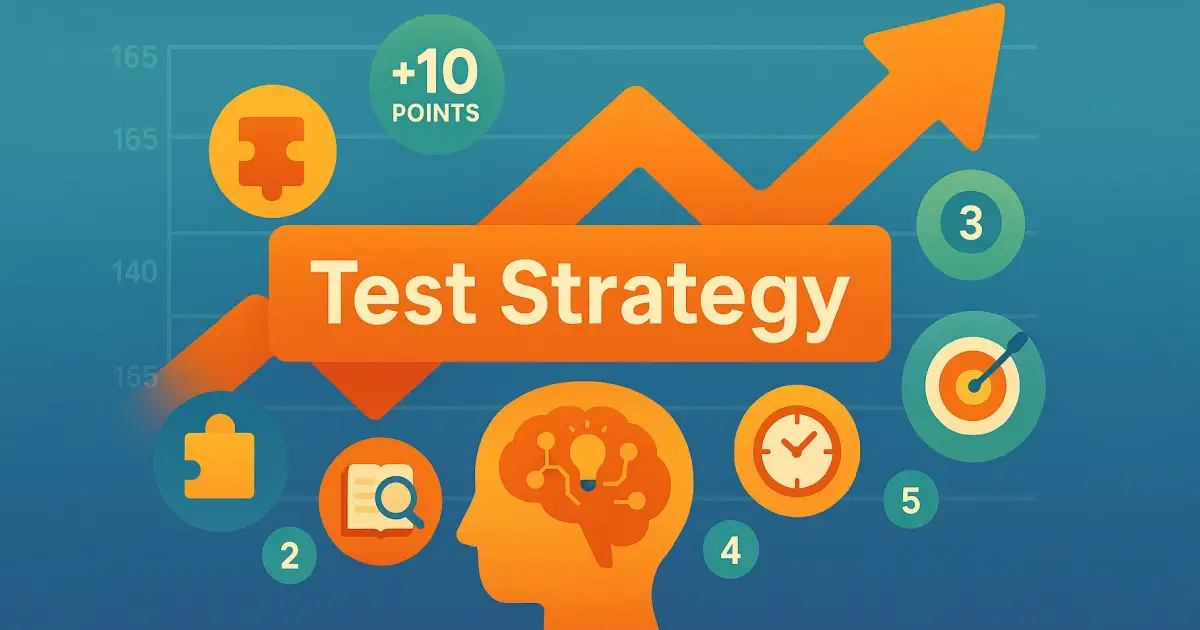Improving your GRE Verbal score requires more than just memorizing vocabulary. These five evidence-based strategies have helped thousands of students achieve significant score improvements.
Strategy 1: Master the Art of Text Completion
Text Completion questions account for about 6 questions per Verbal section. Mastering this question type can add 3-4 points to your score.
The Three-Step Method
Step 1: Read for Logic, Not Details
- Identify the sentence's logical structure
- Look for contrast words (however, although, despite)
- Find continuation words (furthermore, moreover, similarly)
- Spot cause-and-effect relationships
Step 2: Predict Before Looking at Choices
- Cover the answer choices
- Predict what type of word fits logically
- Write down your prediction
- Only then look at the options
Step 3: Eliminate and Confirm
- Cross out choices that don't match your prediction
- Test remaining choices in context
- Ensure the sentence makes logical sense
Common Text Completion Patterns
Contrast Pattern: "Although the politician appeared _____, his actions revealed his true nature."
- Look for words that contrast with "appeared"
Cause and Effect: "Due to the _____ weather, the outdoor concert was cancelled."
- The blank should describe weather that would cause cancellation
Definition Pattern: "The professor's _____ lecture style, characterized by long pauses and unclear explanations, frustrated students."
- The blank should be defined by what follows the comma
Strategy 2: Develop Strategic Reading Comprehension Skills
Reading Comprehension questions make up about 10 questions per Verbal section. A systematic approach can improve your accuracy significantly.
The SOAR Method
S - Skim the Passage Structure
- Read the first sentence of each paragraph
- Identify the main topic and author's stance
- Note transition words between paragraphs
- Don't get bogged down in details
O - Outline the Main Ideas
- Write brief notes for each paragraph
- Identify the passage's overall structure
- Note any shifts in perspective or tone
- Mark important examples or evidence
A - Anticipate Question Types
- Primary purpose questions
- Detail questions about specific paragraphs
- Inference questions requiring logical deduction
- Author's attitude or tone questions
R - Read Strategically for Questions
- Return to relevant passage sections
- Use your outline to locate information quickly
- Eliminate obviously wrong answers first
- Choose the best answer, not the perfect one
Strategy 3: Build Strategic Vocabulary
Instead of memorizing random word lists, focus on high-impact vocabulary strategies.
Root-Based Learning
Learn common roots, prefixes, and suffixes:
- Bene- (good): benefit, benevolent, benign
- Mal- (bad): malicious, malady, malevolent
- -ous (full of): verbose, porous, arduous
Context Clue Mastery
Practice inferring word meanings from context:
- Definition clues: The word is defined in the sentence
- Example clues: Examples help clarify meaning
- Contrast clues: Opposite words provide hints
- Cause-effect clues: Logical relationships reveal meaning
High-Frequency Word Focus
Prioritize words that appear frequently on the GRE:
- Level 1: Essential words (appear in 80% of tests)
- Level 2: Important words (appear in 60% of tests)
- Level 3: Useful words (appear in 40% of tests)
Strategy 4: Master Sentence Equivalence
Sentence Equivalence questions require finding two words that create sentences with the same meaning.
The Parallel Structure Method
Step 1: Understand the Sentence Logic
- Identify the sentence's main idea
- Look for logical indicators (contrast, continuation, cause-effect)
- Predict what type of word fits
Step 2: Find True Synonyms
- Look for words with identical meanings in context
- Avoid words that are similar but not equivalent
- Test both words to ensure they create the same meaning
Step 3: Eliminate Trap Answers
- Partial synonyms: Words that are related but not equivalent
- Opposite pairs: Two words that are opposites of each other
- Unrelated words: Words that don't fit the context
Common Sentence Equivalence Patterns
Contrast Pattern: "Despite his _____ appearance, the actor was quite shy."
- Look for words meaning "confident" or "outgoing"
Cause-Effect Pattern: "The _____ weather forced the cancellation of the outdoor event."
- Look for words meaning "bad" or "severe"
Strategy 5: Develop Time Management Skills
Effective time management can improve your score by 2-3 points by ensuring you answer all questions.
Section Timing Strategy
- 20 questions in 30 minutes = 1.5 minutes per question
- Spend more time on easier questions to ensure accuracy
- Don't spend more than 2 minutes on any single question
- Save 2-3 minutes for final review
Question-Type Timing
- Text Completion: 1-1.5 minutes each
- Sentence Equivalence: 1-1.5 minutes each
- Reading Comprehension: 2-3 minutes per question
- Long passages: Spend 3-4 minutes reading, then 1-2 minutes per question
Pacing Strategies
- Start with easier questions to build confidence
- Mark difficult questions and return to them
- Use process of elimination to save time
- Trust your first instinct when unsure
Frequently Asked Questions
How long does it take to see score improvement?
Most students see measurable improvement after 4-6 weeks of consistent practice. However, a 10+ point improvement typically requires 8-12 weeks of dedicated study.
Should I focus on my weakest area first?
Yes, but balance is key. Spend 60% of your time on weak areas and 40% maintaining your strengths. This approach maximizes overall score improvement.
Conclusion
Improving your GRE Verbal score by 10+ points requires a strategic, systematic approach. Focus on:
- Mastering question-specific strategies for each type
- Building strategic vocabulary through roots and context
- Developing efficient time management skills
- Practicing consistently with targeted exercises
- Analyzing mistakes to refine your approach
Remember, significant score improvement takes time and consistent practice. Implement these strategies gradually, focusing on one area at a time until it becomes automatic.
Start with your weakest area and build from there. With dedicated practice and the right strategies, a 10+ point improvement is not only possible but expected.
Your GRE success depends on smart preparation, not just hard work. Use these proven strategies to maximize your study efficiency and achieve your target score.
